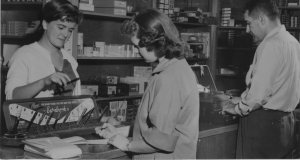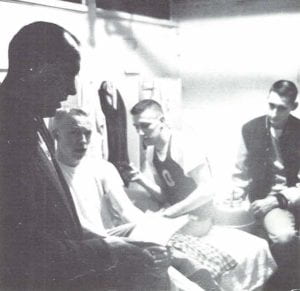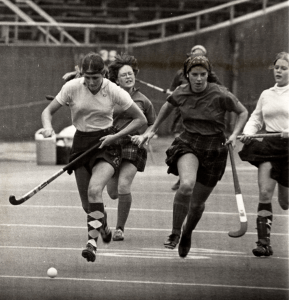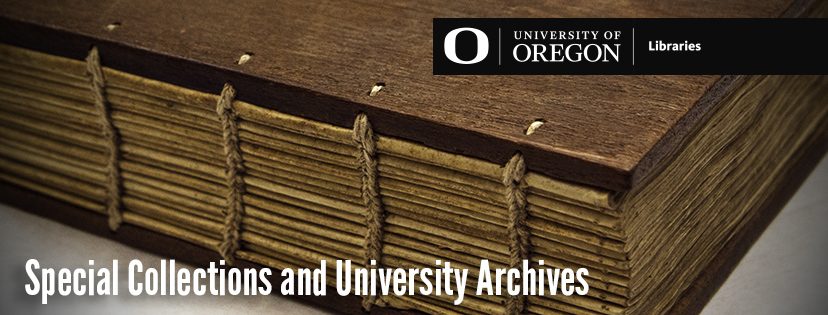Processing Update – March 2024
The SCUA archivists have been hard at work and seventeen more collections were made available for research in March.
The finding aids for these, and all, SCUA collections can be accessed through our archival collections database, Archives West and the UO Libraries catalog.

Collections now available for research:
Bowerman/Nike Shoe Tread, UA 030
William Jay “Bill” Bowerman was born February 19, 1911 in Portland, Oregon and came to the University of Oregon (UO) in 1929 to play football and study. After graduation, Bowerman taught high school biology and coached football, first in Portland and then in Medford, where he started a track team in 1937. In 1948, Bowerman became the freshman football coach at UO and by the 1950’s, was coaching track and field. During a trip to New Zealand in 1962, Bowerman was introduced to the concept of jogging as a fitness routine. He brought this concept back to the United States, and began to write articles and books about jogging, in addition to creating a jogging program in Eugene that became a national model for a fitness program. Bowerman was a highly inventive man. In addition to experimenting with many different types of shoes, he experimented with different types of track surfaces, creating a rubber and asphalt mix for track runways. He helped to create portable runways with this same mixture for use on indoor tracks, but his main area of invention was in the realm of athletic footwear. Before and after retirement, Bowerman worked with Phil Knight as a co-founder of Nike (initially Blue Ribbon Shoes) to develop new and innovative shoe designs. After retirement, Bill devoted more of his time to these endeavors, once using his wife’s waffle iron to create a new type of “waffle” sole for running shoes.

This collection contains two pieces of rubber/synthetic shoe tread, one in waffle pattern, and one pattern Nike patent pending.
American Federation of Teachers, University of Oregon Records, UA 345
The American Federation of Teachers, founded in Chicago in 1916, is the second-largest teachers’ labor union in the United States. The University of Oregon chapter was established to advance the professional interests of teachers at UO, improve terms and conditions of employment, fight bias, promote reciprocal accountability, and support the national AFT. The local chapter has since also affiliated with the national American Association of University Professors and, as of 2007, organizes and advocates as United Academics.
University of Oregon University Budget Ledger, UA 384
The Oregon State Board of Higher Education was the statutory governing board for the Oregon University System from 1909 to 2015 and was composed of eleven members appointed by the Governor of Oregon and confirmed by the Oregon State Senate.
This ledger details the approved final budget for fiscal year 1933-1934 and includes summaries of budget authorizations, notices of changes in budgets for employees and departments, details of salary changes and other documented budgetary considerations.
Field Hockey Scrapbooks Collection, UA 029
Field Hockey was one of the first and most popular women’s sports offered at the University of Oregon (UO) after being established formally in 1945. Throughout its

history, the women’s field hockey team made the National Championship tournament several times and, in 1978, under coach Nancy Plantz, was ranked eighth in the nation. Women’s field hockey at UO The team was formally dissolved in 1979.
University of Oregon Grade Book, UA 402
These grade books are the personal records of University of Oregon professors B.J. Hawthorne (English composition, rhetoric and linguistics) and William E. Overholt (Latin language and Roman history). Spanning the years 1884-1898, the books contain grades, marks and notes for students.
John V. Bovard Faculty Papers, UA 275
John V. Bovard a was faculty in the University of Oregon (UO) Biology department starting in 1906. In 1920, he became the inaugural dean of UO’s Physical Education program, the first such program established in the United States. After leaving UO in 1937, Bovard finished his career at the University of California, Los Angeles (UCLA), where his research examined problems related to human fatigue.
This collection includes the papers created in Bovard’s capacity as a professor of physical education at both UO and UCLA. Topics covered include lecture notes and class records, material related to the Northwest Council of Teach Education Standards for Health, Physical Education and Recreation. A small amount of personal material relates to Bovard’s involvement in clubs and organizations such as the Obsidians, an outdoors enthusiast group based in Eugene.
Committee on the Status of Women records, UA 187
The Committee on Status of Women at the University of Oregon was formed in the 1970s as an ad hoc committee meant to study the status of female employees at the University of Oregon. By the 1990s, the committee reported to the University Senate. The Status of Women Committee ceased to be active in 2005 and was abolished by US07/08-3 in November 2007.
Material in this collection includes committee charges, correspondence, and reports, covering topics including sexual discrimination, tenure, and pay rates.
W.F. Goodwin Thacher Student Notebook, UA 373
William Franklin Goodwin Thacher came to the University of Oregon in 1914 as a Professor of Rhetoric. In 1917, he taught the University’s first advertising course – a copywriting class in the English Department. In 1932, he was named a Professor of English and Advertising and from there developed the advertising program in the School of Journalism and Communication.
This collection consists of Thacher’s course notebook on Constitutional Law of the United States, taught by Prof. Woodrow Wilson in 1898 or 1899. Pages contain notes from lectures, doodles, including drawings of houses, people (perhaps other students), various scribbles of the name “Janet” and doodles referencing “Little Orphan Annie.”
Tau Kappa Epsilon Fraternity Collection, UA 375
Tau Kappa Epsilon, commonly known as TKE or Teke, is a social college fraternity founded on January 10, 1899, at Illinois Wesleyan University and has chapters throughout the United States and Canada. In 1928 TKE became one of the first fraternities to ban hazing, and also never had a racially exclusive policy for membership.
This collection documents the fraternity at University of Oregon from 1943-1949.
George Korn and Mel Le Mon Papers, UA 232
This collection consists of correspondence and telegraphs between George Korn of the Korn Baking Company and Mel Le Mon, a broadcaster at radio station KFAC in Los Angeles, and detail the whereabouts of Joe Duck, as well as upcoming or recent Oregon sporting events. George Washington Korn (1898-1995) was raised in Oregon, first in Portland, and then in Eugene, where his father, Harry, owned and operated the University Bakery. George worked as a clerk at the bakery, first located between the University of Oregon campus and downtown Eugene.
The collection also includes scrapbook pages of photographs and news clippings which document the travels of Joe Duck, and the activities of the Monday Morning Quarterbacks. Of note is a letter from Bing Crosby, claiming to be unaware of Joe Duck’s present location. Loose photographs of a vacation to Cedar Pines Park in 1941 are also included.
YWCA Oregon Chapter records, UA 112
The University of Oregon chapter of the Young Women’s Christian Association was a student group on the University of Oregon campus founded in 1894. The group’s mission was to promote the principles of religion, democracy, and fellowship, as well as student activities, and served as a resource and gathering space for the university’s small female student body. They hosted teas, luncheons, hobby groups such as photography classes, Bible studies, and dinners. The group also published a newspapers, hosted school dances and events for freshman, and sponsored lectures and programs open to the campus community. The collection contains administrative materials such as advisory board minutes, staff meeting minutes, and conference files, as well as constitutions and by-laws. Also included are announcements, evaluations conducted by the national group of the local chapter, reports and resolutions, a copy of the advisor’s handbook, Big Brother/Big Sister program files, and files related to the 1974 Women’s Forum.
Betty Underwood Papers, Coll 644
Mary Elizabeth “Betty” Underwood (1921-2009) was an award-winning author and activist in the Oregon women’s movement. Born in Illinois, she graduated with honors from Pennsylvania State University, and worked as an information analyst for the federal government during and after World War II. Her career in public relations and editing saw her with jobs at Houghton Mifflin, Oregon Public Broadcasting, the Oregon American Civil Liberties Union and George Washington University medical school.
Her writing career saw the publication of two novels for young adults, The Tamarack Tree (1972) and The Forge and the Forest (1975), as well as a memoir, Hostage to Heaven (1979), co-authored by her daughter detailing the Underwoods’ experience with the Unification Church, widely considered to be a cult. The Tamarack Tree received the Jane Addams’ Children’s Book Award in 1972.
Underwood also served on the Portland Cable TV Regulatory Commission (1981-84) and the Oregon Governor’s Commission on the Status of Women (1972-1979) and was extremely active in the Oregon Association of University Women (AAUW).
Fortnightly Club of Eugene Records, Coll 329
The Fortnightly Club of Eugene was organized in December, 1893 by Dr. Alice Hall Chapman, wife of Charles Hiram Chapman, the second president of the University of Oregon. Dr. Hall Chapman was the first president of the original group consisting of twenty-two members, generally conceded to be the first women’s study club west of the Rockies. In 1895, The Fortnightly Club began its first move toward what became a continued dedication: providing and supporting desirable library facilities for Eugene.
This collection includes photographs, news clippings, scrapbooks, meeting records and other materials related to the functions of the Club.
Gum Moon Women’s Residence records, Coll 918
Gum Moon Women’s Residence, previously known as the Oriental Home and School, is a United Methodist Women National Mission Institution that provides women and children in geographic and social transition with short-term housing and life skills training.
The records in this collection document the work and history of Gum Moon Women’s Residence, its predecessor organizations, its programs, and its service to the Asian immigrant community of the San Francisco Bay Area since 1868. The collection contains administrative records, case files, historical materials and publicity, photographs, and certificates.
Nomenus, Inc. records, Coll 421
Nomenus, Inc. is a non-profit religious organization founded in 1984 to create, preserve and manage places of spiritual and cultural sanctuary, for Radical Faeries and their friends to gather in harmony with nature, for renewal, growth and shared learning. Since 1987, Nomenus has maintained an eight-acre Radical Faery Sanctuary in Wolf Creek, Oregon. This collection contains the documents provided by Nomenus Inc. including business papers, correspondence, financial documentation, and building plans, as well as publications of newsletters and magazines, photographs of members, posters of gatherings.
James Ivory papers (accruals), Coll 283
James Ivory is an American film director, producer and screenwriter. He was born in Berkeley, California on June 7, 1928 and in 1933, moved with his family to Klamath Falls, Oregon. After high school graduation in 1946, he enrolled in the University of Oregon’s (UO) School of Fine Arts majoring in architecture, later changing to a general art course. In 1951 he began a graduate program in film production at the University of Southern California. In 1953 he was drafted into the U.S. Army and was trained for the Signal Corps. Through a stroke of luck and resourcefulness on his part, he was assigned to Seventh Army Special Services in Europe with the job of booking cultural events for army units in Germany. During leave times he was able to continue working on film. He returned to the U.S. in 1955 where he completed Venice: Theme and Variations and his master’s degree in Cinematography in 1957.
The University of Oregon Ivory collection presently represents forty years of work, particularly the basic artistic foundation of the Ruth Jhabvala-James Ivory collaboration, backed up by the inventive financial and logistical support of producer, Ismail Merchant. The collection includes material relating to Ivory’s feature films, television programs and commercials, Merchant Ivory Productions materials, and Ivory’s published and unpublished writings, including literary and artistic work done while Ivory was a college student at UO. The collection includes correspondence, screenplays, treatments, storyboards, production notes, promotional material, legal and financial notes, articles, reviews, sketchbooks, notebooks and photographs.
Sally Sheklow papers, Coll 943
Sally Sheklow (1950-2002) was a Jewish lesbian activist, columnist, public health workers, and improvisational performer who lived in Eugene, Oregon. Sheklow arrived in San Francisco in 1967 for the Summer of Love in San Francisco, but after a couple of weeks moved to Eugene, where she enrolled in the University of Oregon (UO) and eventually earned a Bachelor of Arts in Speech, a certificate in Women’s Studies, and a Master’s in Leisure Studies and Services.
After her time at UO, Sheklow worked with the Willamette AIDS Council and the Feminist Women’s Health Center and led workshops on safe sex during the AIDS crisis. She worked as an activist for gay rights and reproductive freedom and organized against a variety of anti-gay political campaigns and legislation. Sheklow also created Balaboosteh, a Jewish lesbian networking group for exploring Jewish feminist spirituality and culture.
This collection includes correspondence, personal papers, activism resources, audiovisual material, and artifacts pertaining to the personal life and activism of Sheklow.

